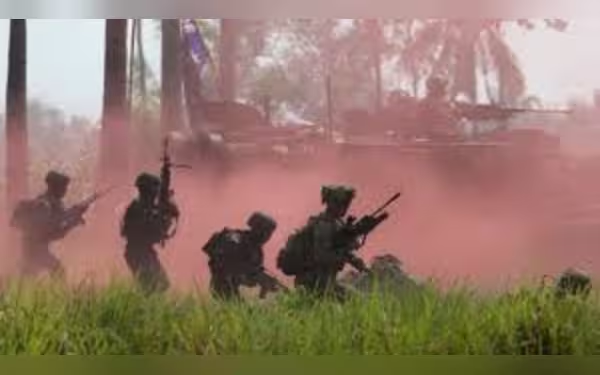Saturday, November 16, 2024 07:24 PM
Indonesia And Australia Strengthen Defense Ties Through Joint Military Drills
- Over 2,000 troops participate in joint military exercises.
- New defense pact marks a historic milestone for both nations.
- Exercises include air, land, sea, and cyber operations.
 Image Credits: thefrontierpost
Image Credits: thefrontierpostIndonesia and Australia conduct joint military drills, enhancing defense ties amid rising Asia-Pacific tensions.
In a significant move to enhance regional security, more than 2,000 troops from Indonesia and Australia participated in joint military drills on Wednesday. This collaboration comes on the heels of a new defense agreement that aims to strengthen ties between the two nations, particularly in light of rising security threats in the Asia-Pacific region. The agreement, signed in August, marks a pivotal moment in the relationship between Indonesia and Australia, as both countries seek to navigate the complexities of regional tensions.
The military exercise, named Keris Woomera, is taking place on Indonesia’s main island, Java, and spans four days. It encompasses a wide range of activities, including air, land, sea, and cyber exercises. Australian Defence Minister Richard Marles has described this operation as “the biggest exercise that Australia will do outside of our nation this year.” This statement underscores the importance both nations place on their military cooperation.
On the first day of the drills, troops executed an amphibious landing at a beach in eastern Java. The Australian embassy in Jakarta reported that the exercise involved tanks, ships, fighter jets, landing craft, assault helicopters, and approximately 2,000 military personnel participating in a live-fire exercise. Such extensive involvement highlights the commitment of both nations to bolster their defense capabilities.
Indonesian President Prabowo Subianto has hailed the new security agreement as a “historic milestone” for the relationship between Indonesia and Australia. The agreement not only facilitates joint drills but also allows for deployments to each country, fostering a deeper military partnership. Prabowo has expressed a desire to take a more assertive stance on the global stage, which was evident during his recent visit to Canberra for discussions with Australian Prime Minister Anthony Albanese.
In addition to the drills with Australia, Indonesia has also engaged in naval exercises with Russia earlier this month, demonstrating its intent to maintain a balanced approach in its foreign relations. Prabowo's recent visits to Beijing and Washington further illustrate Indonesia's strategy of navigating the intricate dynamics between major powers.
As the Asia-Pacific region grapples with increasing tensions, particularly between China and the United States, Australia is keen to solidify its relationship with Indonesia. The two countries, separated by less than 300 kilometers (186 miles) at their closest point, have historically charted different paths in response to geopolitical challenges. While Australia has strengthened its military ties with the United States to counter China's growing influence, Indonesia has opted for a more neutral stance, carefully balancing its relationships with both superpowers.
The joint military drills between Indonesia and Australia signify a crucial step towards enhanced security cooperation in a region fraught with challenges. As both nations work together to address potential threats, their partnership may serve as a stabilizing force in the Asia-Pacific. The evolving dynamics of international relations will undoubtedly continue to shape the future of these two countries, making their collaboration all the more significant in the years to come.













